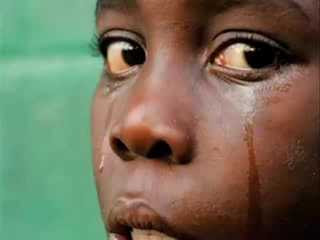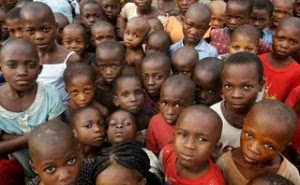World Press Photo of the Year: 1980 Mike Wells, United Kingdom. Karamoja district, Uganda, April 1980. Starving boy and a missionary. About the image Wells felt indignant that the same publication that sat on his picture for five months without publishing it, while people were dying, entered it into a competition. He was embarrassed to win as he never entered the competition himself, and was against winning prizes with pictures of people starving to death.
 Biafra By Don McCullin, 1969
Biafra By Don McCullin, 1969 
A mob of 10,000 whites took sledgehammers to the county jailhouse doors to get at these two young blacks accused of raping a white girl; the girl’s uncle saved the life of a third by proclaiming the man’s innocence. Although this was Marion, Ind., most of the nearly 5,000 lynchings documented between Reconstruction and the late 1960s were perpetrated in the South. (Hangings, beatings and mutilations were called the sentence of “Judge Lynch.”) Some lynching photos were made into postcards designed to boost white supremacy, but the tortured bodies and grotesquely happy crowds ended up revolting as many as they scared. Today the images remind us that we have not come as far from barbarity as we’d like to think.
 The first day of Dorothy Counts at the Harry Harding High School in the United States . Counts was one of the first black students admitted in the school, and she was no longer able to stand the harassments after 4 days, 1957.
The first day of Dorothy Counts at the Harry Harding High School in the United States . Counts was one of the first black students admitted in the school, and she was no longer able to stand the harassments after 4 days, 1957. Martin Luther King, Jr. 1963
Martin Luther King, Jr. 1963Martin Luther King, Jr. raised his arms as he addressed the crowd in his “I Have a Dream” speech in August 1963. His performance there, and the subsequent photos of the crowds and his address, were a turning point in the blossoming civil rights movement.
 Sudanese Child With a Vulture by Kevin Carter, 1994
Sudanese Child With a Vulture by Kevin Carter, 1994
This Pulitzer Prize-winning picture of a vulture waiting to feed on a dying toddler in Sudan summed up the cruelty of the famine in Sudan. It also, famously, highlighted the plight of the photographer; within three months of gaining recognition for this photograph, Kevin Carter committed suicide.
 Kids who are shocked by the civil war in Angola, 1996.
Kids who are shocked by the civil war in Angola, 1996. A man who was tortured by the soldiers since he was suspected to have spoken with the Tutsi rebels, 1994.
A man who was tortured by the soldiers since he was suspected to have spoken with the Tutsi rebels, 1994. A mother in Somalia holds the body of her child who died of hunger, 1992.
A mother in Somalia holds the body of her child who died of hunger, 1992.
Elizabeth Eckford and Hazel Massery by Will Counts, 1957
Elizabeth Eckford was one of the first black students admitted to Central High School in Little Rock, Arkansas. This photo shows her grueling walk to class while being shouted at by white student Hazel Massery. Although Massery would later express regret for her actions, the photo showed the nation and the world the heated strife in the Southern United States.









 The thing that strikes me the most, as I'm sure it will for other people is that number: 218 million, 218 million children in the world who are being exposed to this life every single day, 218 children who have not experienced childhood, 218 million children who have had their lives taken away from them, 218 million children who know nothing other than the life they are living. Along with this, 22, 000 children who die in work related accidents every year, 22, 000 children who die, 22, 000. It completely boggles my mind that things like this happen in our world, that children have to go through this for the rest of their lives.
The thing that strikes me the most, as I'm sure it will for other people is that number: 218 million, 218 million children in the world who are being exposed to this life every single day, 218 children who have not experienced childhood, 218 million children who have had their lives taken away from them, 218 million children who know nothing other than the life they are living. Along with this, 22, 000 children who die in work related accidents every year, 22, 000 children who die, 22, 000. It completely boggles my mind that things like this happen in our world, that children have to go through this for the rest of their lives.